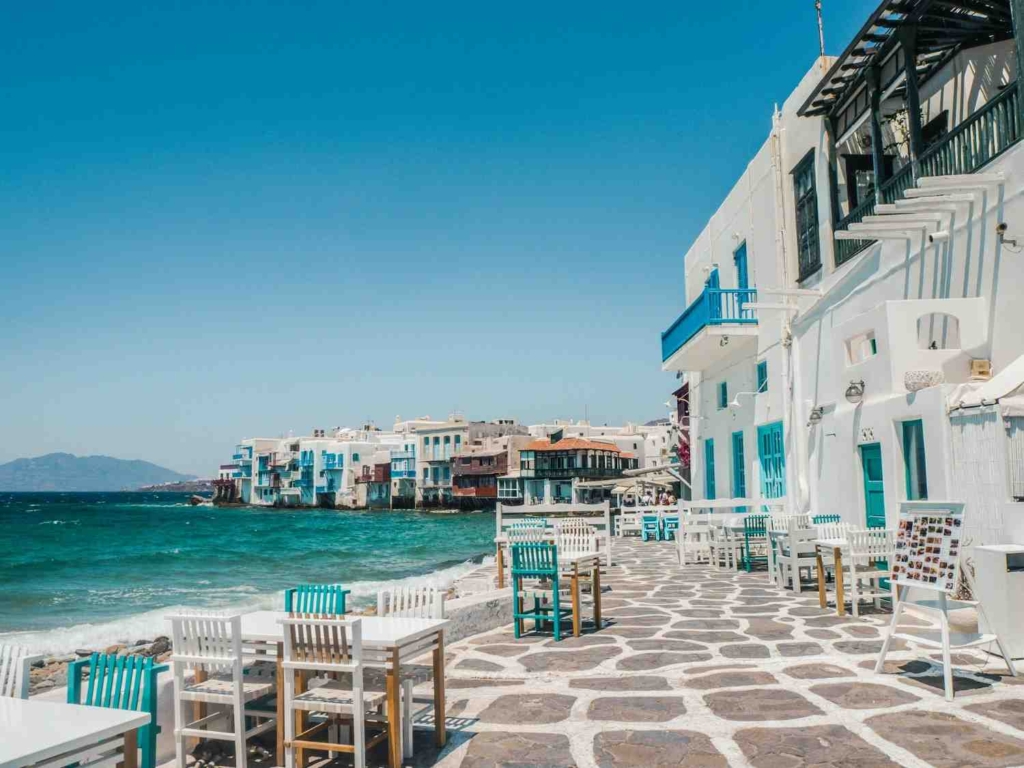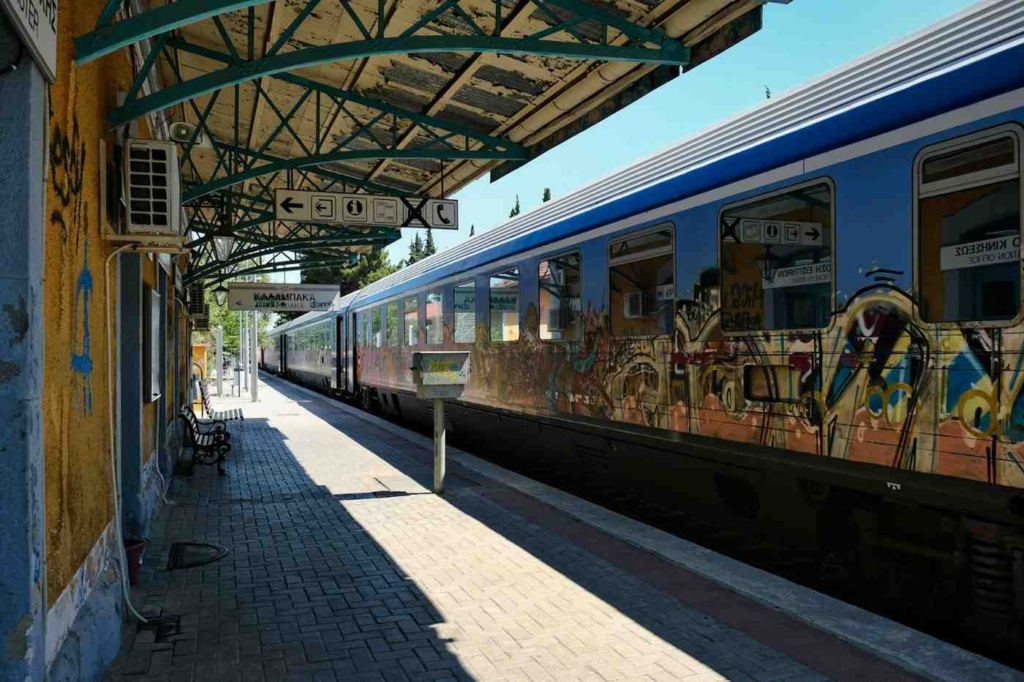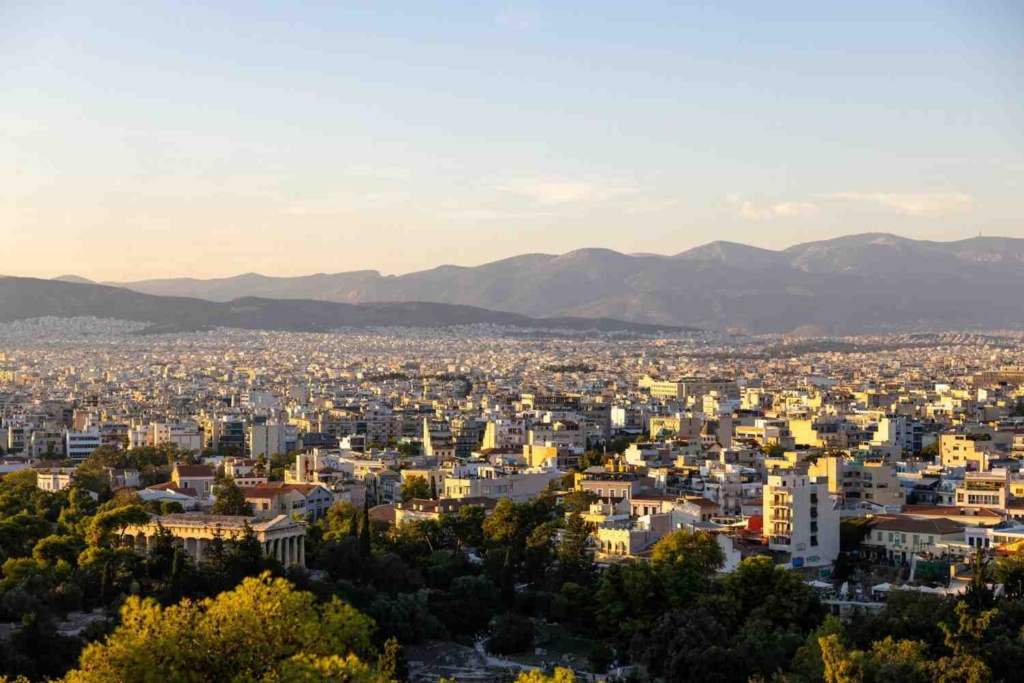
Get Your Free 1st Issue
Your Homes Overseas Magazine!
Discover the best destinations, property tips, and lifestyle insights from around the world.
GET YOUR FREE MAGAZINE HERE!

Discover the best destinations, property tips, and lifestyle insights from around the world.
GET YOUR FREE MAGAZINE HERE!

Living in Europe can be expensive, but the cost of living in Greece is much lower than in many other Western countries. Greece is a beautiful place full of sunshine, beaches, and friendly people. Many travelers, retirees, and expats choose to live here because life feels calm and affordable. You can enjoy tasty local food, visit amazing islands, and still spend less money each month than you might in other parts of Europe.
Before moving or planning a long stay, it helps to learn more about where Greece is and what makes each area special. Living costs can change depending on the city, the size of your home, and how you like to spend your days. For example, life in Athens might cost more than in a small island town. Overall, the cost of living in Greece lets people enjoy good food, warm weather, and a peaceful life without spending too much.

Finding a place to live is one of the biggest parts of your monthly spending. The cost of living in Greece changes a lot depending on the type of home and where you live. Cities like Athens are busier and cost more, while smaller towns or islands can be much cheaper. Good planning helps you balance comfort and cost when thinking about housing in Greece.
Many people who move to Greece start by renting. Prices can change a lot depending on the city and size of the home.
Here’s a simple guide:
Two-bedroom apartments can cost €700-€1,200 in cities and much less in smaller areas. Many listings for rentals in Greece include utilities or furniture, which can help you save money each month.
Buying a home can be a smart choice for those who want to stay long-term. In most places, the average cost per square meter is around €2,700, but this depends on the location. Popular islands and central Athens are more expensive, while rural areas and small towns are more affordable. If you’re planning to invest or settle down, exploring property for sale in Greece gives you many options, from modern city apartments to peaceful countryside homes.
When buying property, remember that taxes and maintenance fees are extra. Homeowners also pay property tax each year and should plan for small repairs and updates. These costs can add up, so it’s important to include them when thinking about the cost of living in Greece. If you’re exploring real estate for international property investment, understanding these local expenses helps you budget wisely and make confident decisions before buying.
The cost of living in Greece is strongly shaped by where and how you live. Renting gives you flexibility, while buying offers stability for the future. Whether you prefer city life or a quiet island, knowing your options helps you choose the best plan for your budget.
When you live in any home, you need to pay for basic things like power, water, and the internet. In other words, these are called utilities, and they can change how much you spend each month. The cost of living in Greece also depends on how much energy you use and the size of your home. So, if you live in a big house or use air conditioning often, your bills will be higher.
These are the main utilities most homes use every month:
In winter, heating can make your bills go up, especially if your home uses electric or oil heaters.
Staying connected in Greece is easy. That is to say, you can find different internet and mobile plans to fit your needs.
Many people choose package deals that combine internet and mobile services to save money.
Winters in Greece can get cold, especially in the north. Homes without good insulation might need more heating, which raises costs. Using less energy, wearing warmer clothes indoors, or choosing efficient systems can help you spend less.
Your monthly utilities can change a lot depending on your habits. Using electricity wisely and finding good internet deals can make the cost of living in Greece easier to manage. Small savings each month can make a big difference over time.

Getting around Greece is simple and fun because there are many ways to travel. You can use buses, the metro, or ferries to move from one place to another. Some people also choose to own a car. How you travel affects your total cost of living in Greece, so it helps to know what each option costs.
Public transport in Greece is easy to use and very affordable. Most cities have buses, and Athens also has a metro system that connects to many areas.
Here’s what you can expect to pay:
Using public transportation saves money, especially if you travel often. It’s also better for the environment and helps reduce traffic in big cities.
Some people prefer having their own car for comfort and freedom. But owning a car adds several costs to the cost of living in Greece.
Here are some typical expenses:
Cars are usually cheaper to buy than in Northern Europe, but fuel and parking can add up quickly. Driving is more common in smaller towns or when exploring the islands.
Ferries are a big part of life in Greece, especially for people living on islands. They are a fun way to travel and see beautiful ocean views.
Travelers often use ferries for weekend trips or vacations. If you live on an island, ferry tickets can become part of your regular expenses.
Transportation in Greece offers choices for every lifestyle. Whether you ride the bus, take a ferry, or own a car, you can find an option that fits your budget. Planning your travel wisely helps keep the cost of living in Greece low while still letting you explore everything the country has to offer.
Eating in Greece is both delicious and affordable. Food is a big part of daily life here, and it affects the cost of living in Greece. You can enjoy fresh fruits, vegetables, and seafood at low prices, especially if you shop at local markets. People who cook at home often spend much less than those who eat out every day.
Buying groceries in Greece is usually cheaper than in many other European countries. Local food is fresh and easy to find, while imported items cost more.
Here are some average prices you might see:
A single person might spend €200-€300 per month on groceries, while families spend more depending on size and diet. Cooking at home helps reduce the overall cost of living in Greece.
Eating out in Greece is part of the fun! Local tavernas serve tasty dishes for low prices, and meals often include generous portions.
Here’s what you might spend:
Dining out a few times a week can fit easily into most budgets, especially if you stick to local spots.
Imported foods, like international snacks or foreign brands, can cost much more. For example, imported cereal, cheese, or sauces might be double the local price. Choosing Greek-made products helps you save money while supporting local farmers.
Food in Greece is fresh, healthy, and often budget-friendly. Shopping at neighborhood markets and eating local dishes keeps the cost of living in Greece affordable. Whether you cook at home or eat at a seaside taverna, you can enjoy great meals without spending too much.

Good health is very important when living in a new country. The cost of living in Greece includes medical expenses, but they are often much lower than in many other countries. People can choose between public and private care, and both offer quality services that help everyone stay healthy.
The government provides healthcare in Greece through public hospitals and clinics. Citizens and legal residents can get care at low or no cost.
Here are some things to know:
For small health concerns, you can also find local doctors who charge about €20-€40 for a simple visit.
Many expats and retirees choose private healthcare for faster service and modern facilities. Private hospitals have English-speaking doctors and shorter waiting times.
Here’s what private care might cost:
Having insurance makes it easier to manage medical bills and adds peace of mind when planning your cost of living in Greece.
Healthcare in Greece is much more affordable than in the U.S. For example, a doctor’s visit in America can cost over €100, while the same visit in Greece may cost less than half. Prescription medicines are also cheaper, and many are available directly from pharmacies without high fees.
Staying healthy in Greece does not have to be expensive. With both public and private options, healthcare in Greece gives residents good care at fair prices. This balance helps make the cost of living in Greece more secure and affordable for everyone.
Families who move to Greece will find many choices for their children’s learning. Schools here focus on strong education and family values. That is to say, these costs can be a small but important part of the cost of living in Greece, especially for families with young kids.
There are three main types of schools in Greece. Each offers something different depending on what families need.
Families also need to plan for school materials.
Here are some common expenses:
Public schools usually give free books, while private and international schools may ask parents to buy them.
Younger children who are not in school may need daycare or preschool.
Typical prices include:
Many Greek families also take part in weekend activities like art, music, or sports classes.
Education and family expenses in Greece can be managed with good planning. Public schools make learning affordable, while private and international schools offer more choices for expat families. These costs are an important part of the overall cost of living in Greece, helping parents create a comfortable and happy life for their children.

Living in Greece is not only about food and housing. It’s also about enjoying life. People here love to spend time with family and friends, go out for coffee, or take walks by the sea. How much you spend on fun and free time will affect the cost of living in Greece, but many activities are affordable and easy to enjoy.
Greece has lots of low-cost ways to relax and have fun. So, you don’t need to spend much to enjoy life here.
Here are some average prices:
People in Greece love to meet outdoors. Many enjoy picnics, beaches, or walks in town squares, which cost almost nothing.
Greece has a long history filled with festivals, music, and art. Understanding tradition in Greece helps you see why celebrations and social life are important. There are many free or low-cost events, such as local dance shows, holiday festivals, and open-air concerts. Joining these helps you feel part of the community without spending too much money.
Many locals enjoy simple things, like meeting friends for coffee that lasts hours or sharing small meals together called “meze.” Learning some fun facts in Greece can make your experience even more enjoyable. For example, in some towns, cafés stay open late into the night, and people of all ages gather to chat and relax.
How much you spend on fun depends on your habits.
Here’s an idea of what people usually spend:
These numbers can change if you travel often, go to concerts, or dine out more frequently. Being mindful of choices helps you manage the cost of living in Greece while still enjoying a happy, social life.
The cost of living in Greece can change a lot depending on where you live. Big cities like Athens are busier and more expensive, while smaller towns and islands can be much cheaper. Each place offers a different mix of lifestyle, comfort, and cost. Knowing the differences helps you plan your budget wisely.
Athens is the capital and the busiest city in Greece. It has more job options, restaurants, and activities, but prices are higher too.
Here’s what you can expect:
Living in Athens means spending more but having everything nearby. It’s perfect for those who love city life and convenience.
Thessaloniki is smaller than Athens but still full of energy. It’s a great choice for students and young professionals.
The overall cost of living in Greece is lower here than in Athens, making Thessaloniki a good mix of comfort and savings.
If you prefer peace and lower costs, small towns and islands are ideal. You can find beautiful views, friendly neighbors, and fresh local food.
The weather in Greece also affects your spending. In warmer areas, you may spend less on heating in winter, but island life may include ferry or travel costs.
You can keep your monthly costs low with a few simple habits:
Making smart choices helps you enjoy a relaxed lifestyle while keeping the cost of living in Greece easy to manage.

Living in Greece can be enjoyable and affordable if you plan your money wisely. With a few smart habits, you can lower expenses and still enjoy everything the country offers. These simple tips can help you control the cost of living in Greece while keeping a comfortable lifestyle.
Food costs can add up quickly, but there are easy ways to save.
So, here are some helpful tips:
These small changes can make a big difference in your monthly budget.
Your home is one of your biggest expenses, but you can still save money.
Try these ideas:
By keeping your energy use low, you can manage the cost of living in Greece more easily.
If you plan to stay long-term, understanding the process for visa and residency in Greece is important. This helps you avoid extra fees or delays. Having the right documents also gives you access to local healthcare, schools, and other benefits. Planning ahead makes settling down smoother and less stressful.
Managing money carefully helps expats and retirees live comfortably.
Here are some simple steps:
Many retirees enjoy peaceful lives here because retirement in Greece offers warm weather, friendly people, and low daily costs.
Saving money in Greece is about living smart, not living less. Shopping local, using less energy, and planning your budget will keep the cost of living in Greece within reach. Whether you are a newcomer or retiree, simple habits can help you enjoy Greek life without financial stress.
Greece is a beautiful place to live, with friendly people, great food, and warm weather. It offers a comfortable lifestyle without spending too much. You can enjoy beaches, history, and tasty meals while feeling safe and relaxed. Many people move here because life feels simple and peaceful.
If you plan your budget carefully, the cost of living in Greece can fit almost any lifestyle. Whether you want to work, retire, or just start fresh, living here can be a happy choice. To learn more about moving or finding a home, you can contact us.
Most people spend between €800 and €2,500 per month, depending on their city and lifestyle. Living in small towns is much cheaper than in Athens or popular islands.
Yes, the cost of living in Greece is generally lower than in Western Europe. Food, rent, and public transport are all more affordable.
In Athens, a one-bedroom apartment costs €400-€700 per month. In Thessaloniki, rent is around €350-€600 per month.
Expect to spend €100-€200 for electricity, water, gas, and internet. Costs depend on home size and usage.
No. Healthcare in Greece is affordable and offers good service. Public hospitals are free or low-cost, and private care is much cheaper than in the U.S.
Groceries for one person cost about €200-€300 per month. Eating at a local taverna can be as low as €5-€10 per meal.
Shop at local markets, cook at home, and choose energy-saving homes. Using public transport also keeps costs low.
Yes, the weather in Greece can change your costs. You might spend more on heating in winter or air conditioning during hot summers.
Yes, retirement in Greece is popular because it offers warm weather, low living costs, and a relaxed lifestyle.
Yes. If you plan to stay for more than a few months, check the rules for visa and residency in Greece before moving.
About International Property Alerts
International Property Alerts is a premier global platform connecting real estate investors with handpicked opportunities in emerging and lifestyle-driven markets. Through curated listings, expert guidance, and market insights, we help buyers make confident property decisions worldwide.
Media Contact:

Phone: +4477 1923 8132
📱 WhatsApp: +63927 073 9530
Email: office@internationalpropertyalerts.com

Elle Resort & Beach Club offers a rare chance to own property in one of the most desirable coastal locations. With limited units, strong capital growth potential, and unmatched resort facilities, this is your opportunity to secure a beachfront lifestyle with long-term value.

Thinking about buying property abroad? Don’t make the move without the right knowledge. Our Free Buyers Guide gives you essential insights on legal steps, taxes, financing, and the best markets worldwide. Trusted by international buyers and investors.

Wake up to bright, spacious living with stunning views and modern comforts. Whether for family living, retirement, or a stylish retreat, Sudara Residences makes your dream home a reality

Discover curated property listings with IPS—residential, commercial, villas, land—and get expert guidance through every step.
BONUS: FREE Cambodia Buyer’s Guide

High visibility. Targeted audience. Maximum exposure. Rent this space and let your brand shine.

Get your properties in front of high-intent investors. Showcase your listings to buyers worldwide.

From pounds to pesos, yen to dollars. ⚡ Quick. Easy. Secure.
Compare listings
ComparePlease enter your username or email address. You will receive a link to create a new password via email.